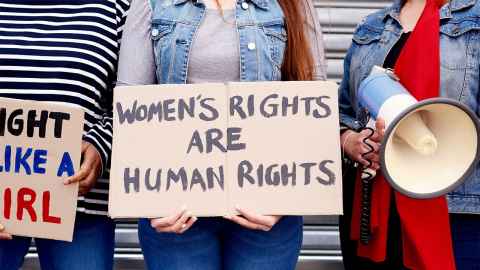A hostility to women’s agency
30 August 2019
Opinion: New research about those who oppose abortion shows the rejection of bodily autonomy is often based on hostility to women, writes Professor Liz Beddoe.

Every day around the world, women and pregnant people decide the time is not right for them to become parents. What happens next depends on whether they live in a country that respects the rights of women to decide what happens with their own bodies, or not.
Some interesting research came out of the US last week. A Supermajority/PerryUndem survey compares the answer of pro-choice and anti-abortion respondents to issues related to women’s rights and gender equality. The issues ranged from the #MeToo movement to whether men make better political leaders.
In all cases, anti-abortion respondents were far more hostile to women’s rights than pro-choice respondents were. This finding should surprise no one. Feminists have been pointing it out for years.
It seems inescapable that opposition to reproductive rights has been, and continues to be, based on hostility to expanding gender roles in society.
We have long known the fate of embryos was not the motivating factor for anti-abortion agitation. Thousands of frozen embryos, the product of infertility treatments, lie unused and unborn, but anti-abortion folks never seem to worry about them.
Last May, Alabama state senator Clyde Chambliss (R) gave the reason for that, when he explained, "The egg in the lab doesn’t apply. It’s not in a woman. She’s not pregnant."
In New Zealand, anti-abortion activists are closely connected with ‘traditional family values’ groups, such as churches and Family First. ‘Traditional family values’ is code for gender roles out of 1950s television shows, with Dad working outside the home bringing in the money, and Mum working in the home for no money.
‘Traditional family’ lobby groups are often aligned with religious institutions. From statements made in comment threads, and from the content of their websites, most New Zealand anti-abortion groups affiliate with Catholic and conservative evangelical Christian churches. Hostility to women’s agency runs like a river of poison through such institutions as demonstrated by the awful histories of the Magdalene Laundries and the Quiverfull Movement, where misogyny is institutionalised and sanctioned.
New Zealand has the opportunity to place itself in the company of countries that treat women as people, as capable as anyone else of making medical decisions for themselves and their families.
Nevertheless, some anti-abortion groups have attempted to rebrand themselves as neutral or supportive toward women. These efforts have foundered on their own rhetoric.
There is often talk about ‘protecting women and children from abortion’. But this ignores the reality that abortion exists because women and pregnant people seek it out as a safe treatment for unwanted pregnancy. Perhaps it sounds convincing to those whose ideology insists that all women are made to be mothers. It is less convincing to those who know people who have received abortion care, or received it themselves. They know first-hand that every pregnancy is individual, that only the pregnant person and possibly their family really understand their circumstances.
Likewise, their ‘love them both’ slogan is a lie. Whatever they may feel for women, they clearly favour the supposed interests of the foetus over hers. They don’t know what a foetus’s interests or desires may be, since you can’t communicate with a foetus. But the interest they project onto the foetus, a desire to be born, conflicts with the pregnant person’s desire not to give birth. Anti-abortion activists clearly intend that the pregnant person’s interests must give way to the foetus regardless of their reasons. They never explain why.
Anti-abortion folks also like to talk about people being coerced into getting abortions they don’t want, and fair enough. We agree with them that coercion is abhorrent - reproductive rights must include the right to keep a wanted pregnancy, and to be adequately supported in high quality healthcare. But they are strangely silent on the other kind of reproductive coercion, the one that New Zealand’s Women’s Refuge research found to be twice as widespread: the coercing of people to become pregnant and to continue a pregnancy as a means of control in intimate partner violence. Perhaps this phenomenon runs counter to the ideology that all women are meant to be mothers.
Rather than telling us anything new, this survey confirms what we have suspected all along about those who oppose abortion: the rejection of bodily autonomy goes along with the rejection of other human rights, and is based in sexism.
New Zealand has the opportunity to place itself in the company of countries that treat women as people, as capable as anyone else of making medical decisions for themselves and their families. For the first western country to recognise women’s right to vote, the world should expect no less.
Professor Liz Beddoe is from the School of Counselling, Human Services and Social Work at the Faculty of Education and Social Work.
This article reflects the opinion of the author and not necessarily the views of the University of Auckland.
Used with permission from Newsroom A hostility to women’s agency on 30 August 2019.
Media queries
Alison Sims | Research Communications Editor
DDI 09 923 4953
Mob 021 249 0089
Email alison.sims@auckland.ac.nz